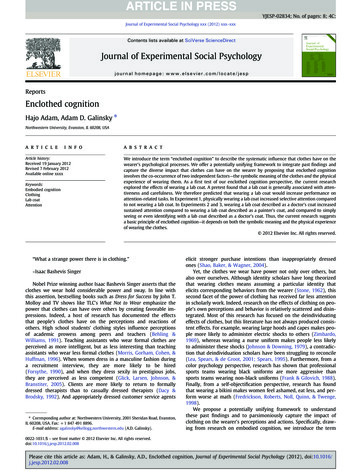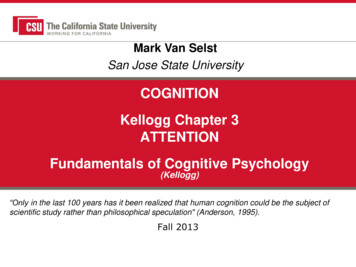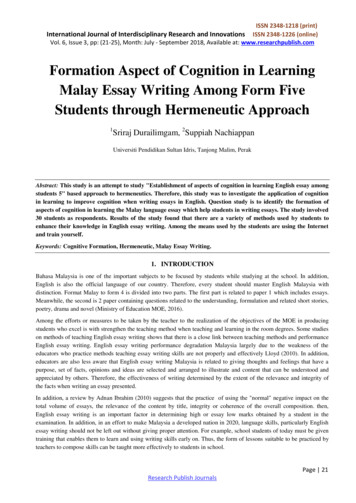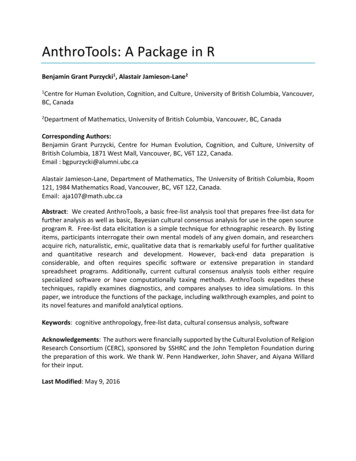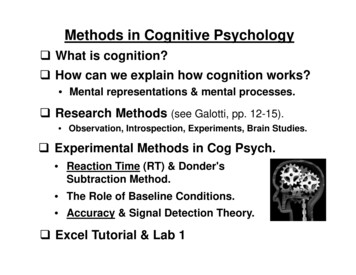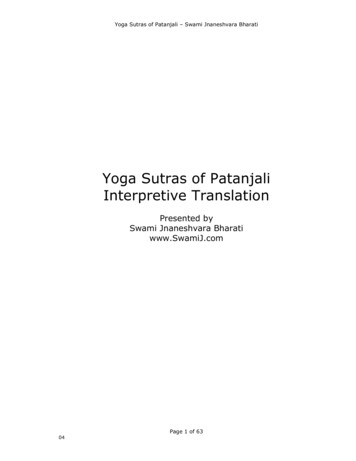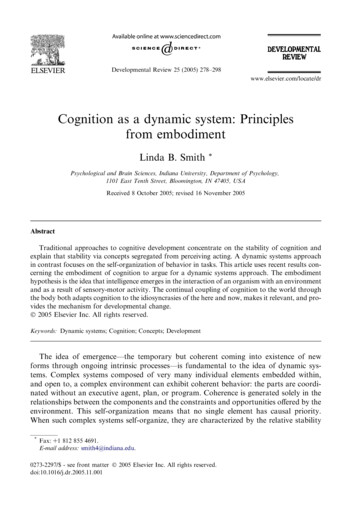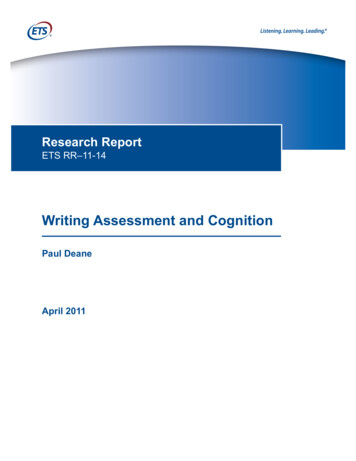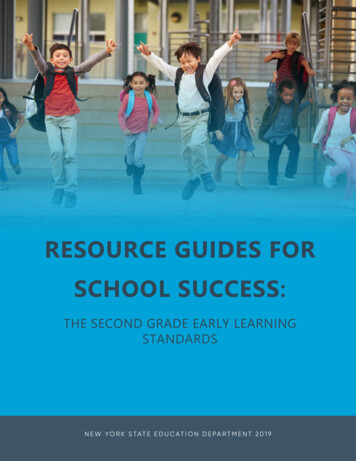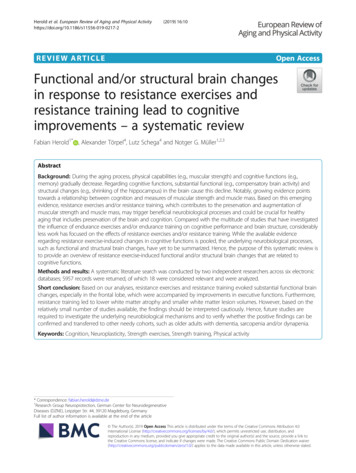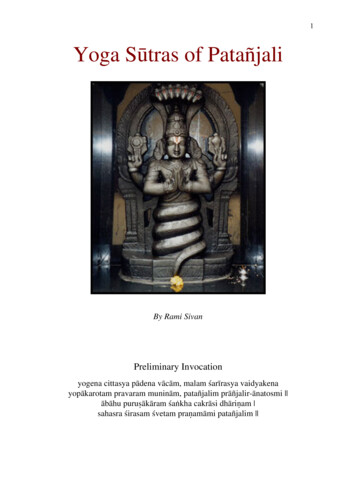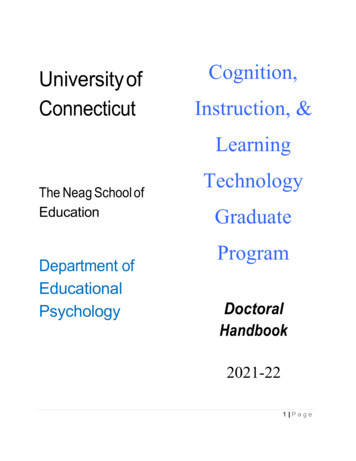
Transcription
University ofConnecticutCognition,Instruction, &LearningThe Neag School ofEducationDepartment ctoralHandbook2021-221 P a g e
Cognition, Instruction & Learning Technology at UCONNTABLE OF CONTENTSPROGRAM OVERVIEW . 3CILT PROGRAM FACULTY. . 4CILT PROGRAM PHILOSOPHY AND GOALS . 8THE ADMISSIONS PROCESS . 9YOUR MAJOR ADVISOR AND ADVISORY COMMITTEE. . 11THE PLAN OF STUDY . 11THE COMPREHENSIVE EXAMINATION . 13THE DISSERTATION . 14HELPFUL RESOURCES. . 15
CILT PROGRAM OVERVIEWHow do people think and learn, and how can an understanding of cognition be put intopractice to design learning and literacy environments? These are questions central to theCognition, Instruction, and Learning Technology program (CILT). Our graduateprograms focus on applying theory and research on learning, thinking, literacy andteaching, to instructional practice for learners of all ages in both formal and informallearning environments. Core courses focus on research methodology, assessment,perception, learning, cognition, instructional design, cognitive development,instructional theories and models derived from cognitive science.The Department of Educational Psychology (EPSY) has a Ph.D., Master’s degreeprogram and a Sixth-Year Professional Diploma program in CILT. These graduateprograms are structured to prepare professionals whose primary interests involve issuesof cognition, learning technologies and teaching, bridging the gaps amongpsychological theory, research, and educational practice.3 P a g e
Cognition, Instruction & Learning Technology at UCONNCOGNITION, INSTRUCTION & LEARNING TECHNOLOGYFACULTYDr. Michael F. YoungAssociate Professor of Educational PsychologyResearch Interests: Situated Cognition as aTheory for Thinking and Learning;Development of Instructional Technologies;Log-File Analyses and Assessments.E-Mail: michael.f.young@uconn.eduDr. Scott W. BrownUConn Board of Trustees DistinguishedProfessor of Educational PsychologyResearch Interests: Problem-based Learning;Learning Technologies; Memory Systems;Problem Solving; Decision Making, Learningand Assessment.E-Mail: scott.brown@uconn.eduDr. James C. KaufmanProfessor of Educational PsychologyResearch Interests: Creativity; Personality;Individual Differences.E-Mail: james.kaufman@uconn.edu4 Page
Cognition, Instruction & Learning Technology at UCONNDr. Kathleen LynchAssistant Professor of Learning SciencesResearch Interests: Education policies tostrengthen STEM outcomes for academicallyvulnerable children; Teacher professionaldevelopment and curriculum reform;Personalized learning; Out-of-school time inSTEME-Mail: kathleen.2.lynch@uconn.eduDr. Ido DavidescoAssistant Professor of Learning SciencesResearch Interests: Neuroscience of Learning;STEM Learning; Authentic Research in K-12Science Classrooms; Teacher-ScientistPartnershipsE-Mail: ido.davidesco@uconn.edu5 Page
Cognition, Instruction & Learning Technology at UCONNCILT PROGRAM PHILOSOPHY AND GOALSThe faculty are committed to a learning environment that stresses a well-organized andexplicit curriculum with clear expectations. However, there is also a strong commitmentto informal student-faculty interaction that further encourages the student’s professionaldevelopment and identification with the field. In addition, the program is designed toacquaint students with the diversity of theories and practices within the field of CILT,allowing the student sufficient intellectual freedom to experiment with differentinstructional delivery systems and various theoretical bases.The atmosphere is intended to enhance student-faculty interaction, critical debate, andrespect for theoretical diversity of practice, leading to an intense and exciting learningexperience. Such a philosophy encourages and reinforces creativity and intellectual risktaking that are fundamental in the student’s further development in CILT.I. Personal Characteristics. Students’ professional activities are expected to conform tothe ethical standards outlined by the American Psychological Association (APA); andin addition, students’ professional activities are to be characterized by:A. An appreciation of diversity and commitment to service that respects theworth, uniqueness, and potential for growth and development of allindividuals.B. Ethical behavior, including respect for copyright and confidentiality, and theResponsible Conduct of Research (RCR).C. The ability to work independently and collaboratively.D. Communication skills in writing, speaking, and multimedia formats.E. Commitment to life-long learning and continuing professional growth.II. Academic Knowledge. Students are expected to be knowledgeable and possess indepth understanding of the following core content areas:A. MotivationB. Cognitive ProcessesC. Social CognitionD. Human DevelopmentE. Instructional DesignF. Creativity and IntelligenceG. Behavior AnalysisH. History of LearningI. Research MethodologyJ. Learning TechnologyK. Multiculturalism/Diversity6 Page
Cognition, Instruction & Learning Technology at UCONNTHE ADMISSIONS dents/how-to-apply-phd-program/)The deadline for submitting an application for consideration to the Ph.D. in the CILTprogram for the Spring semester is November 1st and for the Fall semester, itis December 1st. Applications submitted after these dates will not considered.To apply:Complete the online application to the Graduate School.Submit the following materials, in one completed packet, to the Graduate School:oooooooOfficial transcripts of all collegiate work completed to date;Three letters of reference addressing your potential for success in graduateschool and beyond;Personal statement detailing your fit with the CILT program, a potentialmajor advisor, and your future goals;CT Residence Affidavit;GRE scores; (NOTE: The advanced tests, are not required);TOEFL (international students only);A current résumé or curriculum vita (cv) of not more than two pages.Taken together, the documents in your application file should provide a compellingargument for why you aspire to doctoral work. We strongly suggest that you: Seek excellence in the documents you submit. Provide explanations for your application materials. Help the Admissions Committee understand:o Why do you want the degree?o Why do you want to earn the degree at UConn?o What are you curious about?o Which current faculty appear to have interests most similar to yourown?To the committee, the documents in your application folder must present apersuasive argument for investing in your long-term goals.ResidencyAlthough the CILT Ph.D. program is designed to encourage full-time graduate study,some students work part-time in the community. In most cases, these part-time positionsare related to the student’s graduate program and consequently may even enhance thestudent’s skills, professional maturity, and overall educational goals.7 Page
Cognition, Instruction & Learning Technology at UCONNGiven the intensity of doctoral preparation necessary to assume top leadership roles asuniversity faculty, researchers, administrators, or policy makers, the departmentordinarily admits full-time doctoral scholars. Part-time study requires at least one-yearof full-time study.AdvisorBefore submitting your application materials, study the faculty biographies on ourdepartment’s website to learn about the people, research, grants, courses, andtraditions that are part of our scholarly community. In particular, you shoulddetermine if there is a match between your goals and a Graduate Faculty member inthe program. If so, you should contact that faculty member to discuss your goals.Make note of who you would like your initial faculty advisor to be on thefront cover of your application. Also identify him or her in your PersonalGoal Statement and why you feel this would be a match.Personal Goal StatementThe CILT faculty will read your statement with great care. Your statement shouldinclude detailed reasons for pursuing doctoral study. The statement should discuss:1) Your Backgrounda) How your experiences (education, work, volunteer, or personal) haveprepared you for the rigors of doctoral study.2) Your Goals for Doctoral Studya) Your career goals, initial research interests, intended facultyadvisor, and how you feel these match the program and yourintended faculty advisor’s work.The information in your Personal Goal Statement is used to determine how wellyour goals align with the interests and expertise of the CILT faculty, and todetermine if the faculty member you indicated is available to serve as your advisor.It is essential that your Personal Goal Statement be detailed, well-written, andcomposed with cognizance of the specific areas of graduate specialization availablein the department.If you have been encouraged by a specific professor to apply as a prospectivedoctoral advisee of him or her, you should mention that faculty member in thestatement. Your statement should be double-spaced, 12-point font, and between500-1,000 words.InterviewIn most cases, promising applicants will be scheduled to interview with the CILTfaculty. Ordinarily, the interview will be located at the Storrs campus, although, atelephone or internet interview can be arranged.8 Page
Cognition, Instruction & Learning Technology at UCONNThe Admission Committee DecisionsThe admission committee review process can result in two possible decisions, which aredescribed below.1. Admission: Every student who has been accepted for doctoral study is maileda letter from the Graduate School informing him or her of this action. Theletter names your area of study within the department and the faculty memberwho has agreed to serve as your major graduate advisor.2. Denied Admission: Every student who has not been accepted for doctoral studyis mailed a letter from the Graduate School informing him or her of this action.Reapplication for admission and consideration by the Committee may be made in theyear following the initial application but not until additional evidence is available tothe Committee (e.g., additional testing, further graduate work, or additionalrecommendations from faculty).YOUR MAJOR ADVISOR AND ADVISORY COMMITTEEEach student upon formal admission to the Ph.D. program in CILT is assigned a majoradvisor who will guide the student in developing their plan of study. During the secondsemester of the program, the student selects an advisory committee chairperson and twocommittee members to advise and direct the student’s course of study.Students are evaluated with a variety of methods throughout the program. In addition toformal evaluations such as course grades, the faculty may evaluate the student’s progressthrough the student’s professional activities, such as research projects, and authoredpapers presented and publications. An annual faculty review of the student’s progress isconducted by the advisory committee and CILT faculty. In order to continue on theprogram, students must make satisfactory progress annually through the program asdeemed by the advisory committee and CILT faculty.9 Page
Cognition, Instruction & Learning Technology at UCONNTHE PLAN OF STUDYThe Plan of Study outlines the coursework, professional experiences, and researchefforts that a doctoral student will undertake. Because the Ph.D. in CILT is a researchoriented degree, it is granted to a graduate student only when evidence indicates apattern of pursuing powerful ideas, developing distinctive expertise, cultivatingprofessional commitments, and engaging an able imagination (see DepartmentalValues). The degree is never awarded solely for a required period of study or thecompletion of a prescribed program of course work. Although minimum creditrequirements are established to ensure a common ground for graduate students todevelop emerging expertise, the Plan of Study is a means for cultivating these valuesand patterns of scholarly engagement, not a mechanism for tallying credits.General FeaturesThe Plan of Study is developed between the Advisory Committee and doctoral student.As required by the Graduate School, the Plan: Must be submitted when the student has completed no more than 12 credits ofcoursework. Must be submitted to the Graduate Records Office for approval by the ExecutiveCommittee of the Graduate Faculty Council. Must be submitted before the student takes the General Examination. Must include 20 to 24 credits of coursework beyond the Master’s degree,exclusive of any related or supporting area offered in lieu of a non-creditlanguage requirement. Must include at least six credits of advanced work in a related or supporting area,or, students must demonstrate that they have competent reading knowledge of aleast one foreign language appropriate to the general area of study. Must include at least 15 credits of GRAD 6950, Dissertation Research, must beincluded in the plan of study. May include credits from other institutions, as well as non-matriculated credits,so long as they are post-Master’s degree credits. May include credits acquired while pursuing a Sixth Year Certificate, withapproval of the Advisory Committee.Required, Recommended, and Optional CoursesThe list below presents courses taken by students in our Ph.D. program. The list includescore courses that all students must take. In addition, the list presents courses that arerecommended for each of the three emphases (i.e., instructional psychology, educationaltechnology, and measurement and evaluation) sponsored by our program.10 P a g e
Cognition, Instruction & Learning Technology at UCONNCore Courses for Graduate Students in CILTEPSY 5605 Quantitative Methods in Research IEPSY 5607 Quantitative Methods in Research IIEPSY 5510 Learning: Its Implications for EducationEPSY 5602 Educational Tests and MeasurementEPSY 5220 Introduction to Educational TechnologyEPSY 5621 Construction of Evaluation InstrumentsEPSY 5613 Multivariate Analysis in Educational ResearchEPSY 5515 Professional Seminar in Cognition & Instruction (2 Credits)EPSY 5530 Theories of Learning, Cognition, and InstructionEPSY 5520 Instructional DesignEPSY 5540 Research Ethics in Education and PsychologyEPSY 6601 Principles and Techniques of Educational ResearchGRAD 6950 Dissertation Preparation (15 credits)Recommended Courses for Graduate Students in CILTEPSY 5230 Web-based LearningEPSY 5195 Distance LearningEPSY 5240 Interactive Learning EnvironmentsEPSY 6230 Advanced Educational TechnologyPSYC 5615 Human FactorsPSYC 5621 Simulation and TrainingEPSY 5302 Program EvaluationEPSY 5750 CreativityEDLR 5302 Program Evaluation for School ImprovementEDCI 5875 Multicultural EducationEDCI 6000 Qualitative Methods of Educational Research IEDLR 6052 Qualitative Methods of Educational Research IIEPSY 6560 Instructional PsychologyEPSY 6626 Sampling and Survey Research MethodsEPSY 6636 Measurement Theory and ApplicationEPSY 6637 Item Response TheoryEPSY 6611 Logistic and Hierarchical Linear ModelsEPSY 6194 Doctoral Seminar: MotivationEPSY 6550 Situated CognitionPSYC 5420 Cognitive DevelopmentPSYC 5567 CognitionPSYC 5572 Sensation and Perception IIPSYC 5575 Introduction to Cognitive SystemsEDLR 5203 Adult and Experiential LearningEDLR 5201 Influences on Adult Learning11 P a g e
Cognition, Instruction & Learning Technology at UCONNTHE COMPREHENSIVE EXAMINATIONThe Comprehensive Examination procedures for Cognition, Instruction, and LearningTechnology (CILT) consists of a portfolio assessment in the areas covered in core CILTcourses and representative of each student's program. Students will submit anindependently designed portfolio consisting of their best research work,comprehensively representing their breadth and depth of knowledge and researchcapabilities acquired through their program of study at the University of Connecticut. Thecomprehensive examination process culminates in an oral examination arranged by thestudent's advisory committee. Please refer to CILT Ph.D Comprehensive Examinationson the CILT website for more information.THE DISSERTATIONDissertation research is the vehicle through which students learn to independentlyconduct, complete, and communicate research. The doctoral dissertation should revealthe student's ability to discover, analyze, interpret, synthesize, and disseminateinformation through the process of:(1) Generating a research question of interest and import to the student's chosenfield;(2) Placing the research question in the context of research literature relating to theproject with a particular emphasis on prior scholarship on which thedissertation is built;(3) Describing and executing appropriate methodology;(4) Presenting results in a logical manner; and(5) Fully and coherently discussing the meaning of the results.The dissertation should be:(1) Original (i.e., it builds on or extends what is currently known).(2) Substantial and researchable (i.e., it addresses a significant problem that:(a) Poses a puzzle to the field at a theoretical, methodological, or policy level;(b) Requires an analytical discussion, beyond simple cataloging or describing;and(c) Employs a reasonable research methodology).(3) Manageable (i.e., the scope of the project is appropriate given limited time andresources).Educational Psychology Department Dissertation Rules and GuidelinesThe Department of Educational Psychology maintains a number of online resources tohelp students successfully navigate and complete the dissertation process:12 P a g e
Cognition, Instruction & Learning Technology at UCONNEducational Psychology Department Dissertation Proposal Guidelines-and-Forms.pdfUniversity of Connecticut Graduate School Dissertation edu/registrar/gradschool/forms/guide dissertation.pdfHELPFUL RESOURCESThe CILT website includes a collection of resources that students have found to behelpful. These include documents containing advice from professor and studentsperspectives.Financial SupportThe Department of Educational Psychology has a very limited number of graduateresearch assistantships and fellowships for CILT Ph.D. students. Positions arecompetitive and generally students must apply annually for positions as funding patternsoften change. Check the CILT website often for updates on open positions and otheropportunities.LaptopsAll CILT students are expected to begin their graduate studies with a laptop, as this isconsidered a critical tool for your academic development. Information on the type oflaptop and configurations are updated annually and listed onal-technology/future/computerrecommendations/The CILT Program WebsiteThere are many current useful resources available on the CILT program website locatedat http://cilt.education.uconn.edu/. You are encouraged to check it often for updates andnews links relevant to your graduate studies. You can also follow update on FaceBook athttps://www.facebook.com/UConnCILT13 P a g e
E-Mail: michael.f.young@uconn.edu Dr. Scott W. Brown UConn Board of Trustees Distinguished Professor of Educational Psychology Research Interests: Problem-based Learning; Learning Technologies; Memory Systems; Problem Solving; Decision Making, Learning and Assessment. E-Mail: scott.brown@uconn.edu Dr. James C. Kaufman
